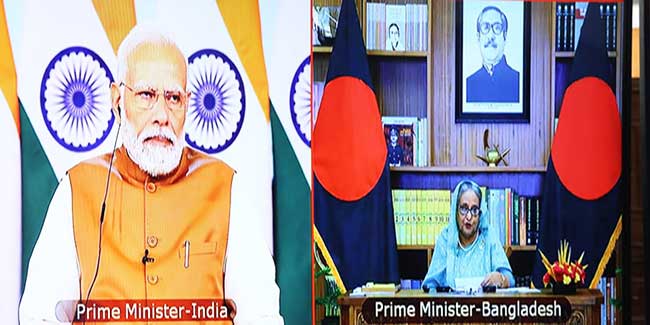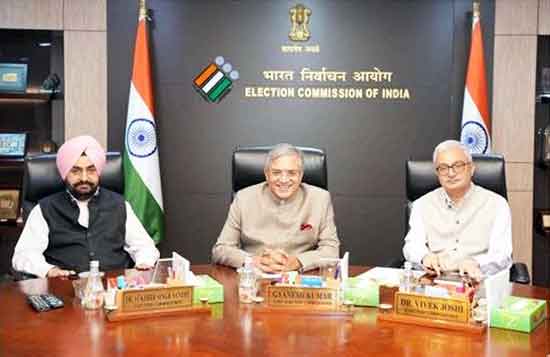With the execution of Agartala-Akhaura railway project, which was virtually inaugurated by Prime Ministers of India and Bangladesh on Wednesday, the rail route distance between the northeastern states and Kolkata would be reduced to 500 km via Bangladesh from the existing 1,600 km via Guwahati.
Prime Minister Narendra Modi and his Bangladesh counterpart Sheikh Hasina on Wednesday virtually inaugurated the Agartala (Tripura)-Akhaura (Bangladesh) railway project along with 1,320 MW generation capacity Maitree Super Thermal Power project at Rampal in Bangladesh’s Khulna division, and the 86.87 km Khulna-Mongla port rail line project.
All the three projects are financially assisted by India.
Tripura Chief Minister Manik Saha, who also attended the virtual event, later said the Agartala-Akhaura railway project would reduce the rail route distance between the northeastern state and Kolkata to 500 km via Bangladesh from the existing 1,600 km via Guwahati.
“The railway project would not only boost the connectivity of the northeastern states, but also flourish tourism, trade and economy. Due to the initiative of Prime Minister Narendra Modi, there has been a sea change in the connectivity and transportation sectors in the northeastern states,” Saha told the media.
He said the escalated cost of the Agartala-Akhaura railway project, which was approved by the governments of India and Bangladesh in July 2016, rose to Rs 1255.10 crore.
The 12.24 km Agartala-Akhaura railway line (5.46 km in India and 6.78 km in Bangladesh) is linked with Akhaura through an international immigration station at Nischintapur in western Tripura, the Chief Minister said.
Funded by India’s Development of North Eastern Region (DoNER) and Ministry of External Affairs (MEA), the Northeast Frontier Railway (NFR) is the nodal agency of the Agartala-Akhaura railway project, which was in principally agreed in January 2010 when Bangladesh Prime Minister Hasina met then India Prime Minister Manmohan Singh during her visit to New Delhi.
As part of the trial run through the newly built Agartala-Akhaura railway line, a Bangladeshi goods train reached Nischintapur on Monday.
The Agartala-Akhaura railway project, which is a dual gauge line for both passenger and goods interchange between India and Bangladesh, would enable people of the northeastern states, especially Tripura and southern part of Assam and Mizoram, to visit Kolkata by rail saving 22 hours of travel time.
Railway officials said the Indian Railways portion has a broad gauge system while the portion in Bangladesh is a metre gauge system.
Currently, the people of the region, especially those in Tripura and its adjoining areas, go to Kolkata via Guwahati by rail, spending more than 38 hours.
The new railway project is part of India’s ‘Act East Policy’, which aims to promote economic cooperation and develop strategic ties with countries in the Asia-Pacific region.
The northeast region, comprising eight states, has been earmarked as a priority region in this policy.
The Agartala-Akhaura line is the first railway line between northeast India and Bangladesh, though there are few rail links between West Bengal and Bangladesh.
These include Gede-Darshana, Benapole-Petrapole, Singhabad-Rohanpur, Radhikapur-Birol and Haldibari-Chilahati routes.
The Ministry of DoNER has funded the railway line from Agartala to Nischintpur; whereas the MEA has funded for the rail line from Nischintpur to Gangasagar station in Bangladesh.






India exercised its right to respond to terror acts: Govt briefs the nation on 'Operation Sindoor'
India has exercised its right to respond to dastardly acts of terror emanating from the neighbouring nation, the government said on Wednesday, hours after Indian armed forces destroyed terror camps in Pakistan and Pakistan-occupied Kashmir (PoK).
India destroys JeM's Markaz Subhan Allah terror camp in Pakistan's Bahawalpur
In a major counter-terrorism offensive, India on Wednesday destroyed ‘Markaz Subhan Allah’, the Jaish-e-Mohammed (JeM) terror headquarters and training facility in Bahawalpur, Pakistan.
'Support India's right to self-defence,' Israel backs 'Operation Sindoor'
Israel has extended its support to India's right to defend itself from terrorism as Indian armed forces carried out 'Operation Sindoor' against nine high-value terror targets in Pakistan and Pakistan-occupied Kashmir.
After 'Operation Sindoor', Pakistan Army resorts to heavy artillery fire on J&K LoC
After successful targeting of nine terrorists' sites in Pakistan by the Indian armed forces on Wednesday, the Pakistan Army resorted to heavy mortar shelling on the Line of Control (LoC) for the 13th consecutive day.
World must show zero tolerance for terrorism: EAM Jaishankar
In a military operation following the Pahalgam terror attack, which claimed 26 civilian lives, India launched 'Operation Sindoor', striking nine high-value terror targets deep inside Pakistani territory.
World cannot afford military confrontation between India & Pakistan: Guterres
Secretary-General Antonio Guterres remains “very concerned” about India’s military operation against Pakistan, saying “the world cannot afford a confrontation between the two countries”, according to his Spokesperson Stephane Dujarric.
PM Modi constantly monitored ‘Operation Sindoor’ as Indian Army hit 9 targets successfully
In a major military action following the brutal Pahalgam terror attack that killed 26 civilians, the Indian Army successfully executed ‘Operation Sindoor’, hitting nine high-value terror targets deep inside Pakistan.
Pakistan PM Shehbaz Sharif confirms India’s decisive action, admits attacks on five sites
Pakistan Prime Minister Shehbaz Sharif on Wednesday confirmed India’s decisive action against the terror infrastructure and acknowledged the attacks on five locations inside his country.